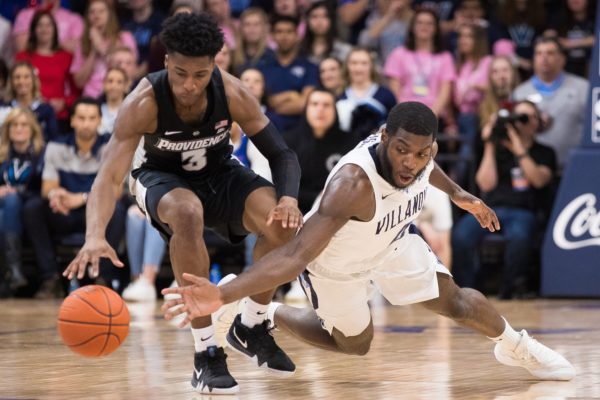Point Guard Woes Plague Providence This Season
Posted by Brad Cavallaro on February 14th, 2019Providence’s offense this season is among the worst in high-major basketball. In fact, Georgia Tech, Wake Forest, Rutgers, Northwestern and Stanford are the only high-major teams that are worse, per KenPom. If you are a team with postseason aspirations, you do not want to be associated with this group.

Poor shooting plays a role in the Friars’ offensive ineffectiveness, as they rank dead last in Big East play in both three-point and two-point shooting, and ninth in free throw shooting. Providence has multiple capable shooters on the roster, but all too often, their open looks do not fall. Their best shooter, AJ Reeves, is still not fully acclimated from a mid-season foot injury. The bigger concern, however, is point guard play. The trio of Makai Ashton-Langford, David Duke and Maliek White have, quite simply, not gotten the job done. They have been largely ineffective at creating offense for themselves, but more importantly, have not been able to create for others either.
In recent years, the engine that drove Providence’s offense has been its point guard — players like Kyron Cartwright, Kris Dunn, Bryce Cotton and Vincent Council led the team — not to mention the Big East in assists — throughout Ed Cooley’s tenure. Those players typically did their best work in pick-and-roll scenarios, especially at the end of the shot clock.

Unfortunately, the Friars’ three current lead guards have not been effective in these situations.

Duke is the best overall player of the group, but he is the weakest at the point guard position and generally looks unnatural playing there. He has great size and is strong defensively, but his court vision is poor and he often struggles to initiate offense. Even when the freshman is playing well,
his propensity for picking up needless offensive fouls makes it difficult to keep him on the court.
Ashton-Langford is the best option of the trio in terms of running the offense, but he is very risk averse about penetrating the lane. This is true despite beginning his career as an aggressive driver, but it seems like he is struggling to balance his role. The sophomore remains an above average defender, but lately he has been a complete non-factor on the offensive end, averaging a mere 3.0 PPG in his last 10 games while mired in a 1-of-18 slump from three-point range. Ashton-Langford could carve out a future as a steady lead guard in the Big East, but he will have to reduce his turnovers to effectively play that style.
Lastly, White is the best passer and the best shooter of the group, but he is the most inconsistent by a significant margin. When he plays well, he is hitting three-pointers, finishing at the rim, defending at a high level, and finding teammates with impressive passes. However, he is invisible on the court just as frequently. This inconsistency is why he has been relegated to a smaller reserve role and now plays fewer minutes than both Duke and Ashton-Langford in Cooley’s rotation. Confidence seems to be a major issue for White because there are times when he turns down open looks and appears to lose his aggressiveness when his shot is not falling.
With a 4-8 Big East record heading into the home stretch, Providence has serious work ahead if it hopes to enter the NCAA Tournament conversation. While they have pulled off several impressive late runs in the past, they will have to do so this season without a dynamic veteran point guard. Whether that is possible still remains to be seen, but indications to this point suggest that it is time to start thinking about growth curves leading into next year.









































